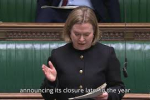
Earlier this month, I delivered a speech at the second reading of the Children’s Wellbeing and Schools Bill. The proposed legislation, now at committee stage where line-by-line scrutiny takes place, brings in a swathe of changes to homeschooling, academies and looked after children; read on for my thoughts.
Perhaps most drastically, the Bill wants to roll back Academies – a status that all secondary schools in South West Devon hold. Academies would be required to teach a state-approved national curriculum, follow national pay and conditions stipulated by teachers’ unions, and admit children directed by local authorities.
The Government’s reasoning that “the current discrepancy between maintained schools and academies leaves potential for inconsistencies in education standards, opportunities and outcomes for pupils from different types of schools” neatly fits Churchill’s ploy that those on the left are concerned with “the equal sharing of miseries”, rather than fostering excellence. Parents will have mixed views, but academies have undoubtedly helped drive up school standards by putting more power in the hands of headteachers.
Later on in my speech, I queried the Bill’s plan to red tape homeschooling and remove parental choice. If passed, a compulsory Children Not in School register will be introduced for all home educated children; parents will have the automatic right to home educate their children withdrawn under certain circumstances; and the safety of home environments will be at the discretion of local authorities.
This Bill uses a hammer to crack a nut. Yes, we must acknowledge that there is a risk of children going missing from education and that home-schooling can be used for inappropriate reasons, as with the tragic case of Sara Sharif. However, many parents opt to home-educate with their child’s interests at heart and are doing an excellent job. In South West Devon, many home educators that have written to me are deeply concerned about the proposed over-regulation that they face in the Bill. The requirements are unnecessarily onerous in my view and should be reviewed. I believe we should be able to find a middle ground.
I welcomed the Bill’s commitment to require local authorities to provide suitable accommodation for formerly looked after children well into adulthood. At a Parliamentary reception I co-hosted last year, care-experienced young people—Tahir, Bella, William and Jess—shared powerful stories of how living within a household had enabled them to pursue education and work, given them a place to call home, and even a second family.
The October 2024, ‘Voices of Supported Lodgings’ report found that every support category listed in the Bill – wellbeing, relationships, education, employment, and participation in society – has been proven to be provided by supported lodgings. Supported lodgings are where a young person stays with a family who provides them with life skills. It is a winning formula. Given this, I asked the Education Secretary if the Government would champion supported lodgings and, at a ground level, help local authorities to recruit and train hosts.
Also, for those previously looked-after people seeking private rented accommodation, unable to secure a deposit or guarantor from a family member, I asked for the Government to use local authorities to facilitate a rent deposit and guarantor scheme. I will always use Opposition to be constructive. It is my genuine hope that these recommendations are taken seriously.





